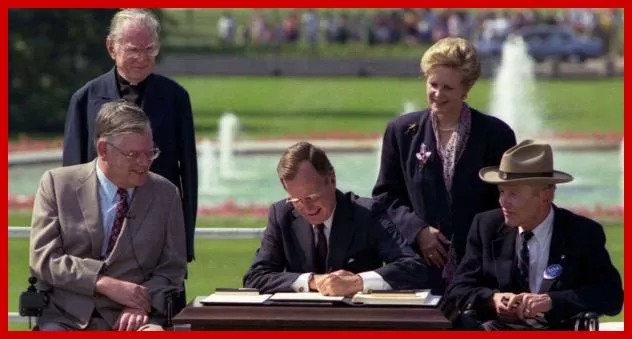
The Americans with Disabilities Act (ADA) became law in 1990. The ADA is a civil rights law that prohibits discrimination against individuals with disabilities in all areas of public life, including jobs, schools, transportation, and all public and private places that are open to the general public. The purpose of the law is to make sure that people with disabilities have the same rights and opportunities as everyone else. The ADA gives civil rights protections to individuals with disabilities similar to those provided to individuals on the basis of race, color, sex, national origin, age, and religion. It guarantees equal opportunity for individuals with disabilities in public accommodations, employment, transportation, state and local government services, and telecommunications. The ADA is divided into five titles (or sections) that relate to different areas of public life.
City of Los Angeles Timeline (1972 - 2025) of the ADA
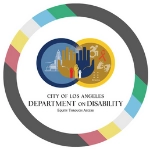
The events leading to the singing of the ADA were pivotal in shaping the legislation, creating a movement for social change, empowerment and community building.
Explore the timeline and learn of the vital moments that happened here in Los Angeles.
1972
In 1972, Norma Jean Vescovo, Director of the Western Center on Law & Poverty and soon-to-be Executive Director of the Independent Living Center of Southern California, Inc. (ILCSC) visited Los Angeles City Hall, with two persons in wheelchairs, to check on its accessibility. They found the building to be almost completely inaccessible, with stairs everywhere. The only office they could access there turned out to belong to Councilmember Tom Bradley. They spoke with his assistant and told him of the inaccessibility of the building. He said that he would tell the Councilman.
About two weeks later, Councilman Bradley called Norma! They talked about the inaccessibility of the building. Bradley said that he was running for Mayor of the City of Los Angeles, and if he was elected, he would work with Norma to fix it. He asked her to put together a group of people that would help them.
Upon being elected, Mayor Bradley kept his promise and worked with Norma and her group to make the modifications to City Hall for accessibility. This led to the development and beginnings of the City of Los Angeles Department on Disability (DOD).
Shortly after this, the Rehabilitation Act was passed in 1973 and in 1990 the Americans with Disabilities Act (ADA) was enacted into Federal law. The disability movement was alive and well, with changes and laws that worked together to promote access for all. Through the tireless efforts of Norma and others like her, Americans with disabilities gained their independence through equal access.
Tom Olin - covering the period between the 1980's and 1990's
March 6, 1988 - Walk of Shame Protest: Activists chipping at the Hollywood Walk of Fame Saturday in a symbolic attempt to create curb cuts for disabled access to the famous sidewalk.
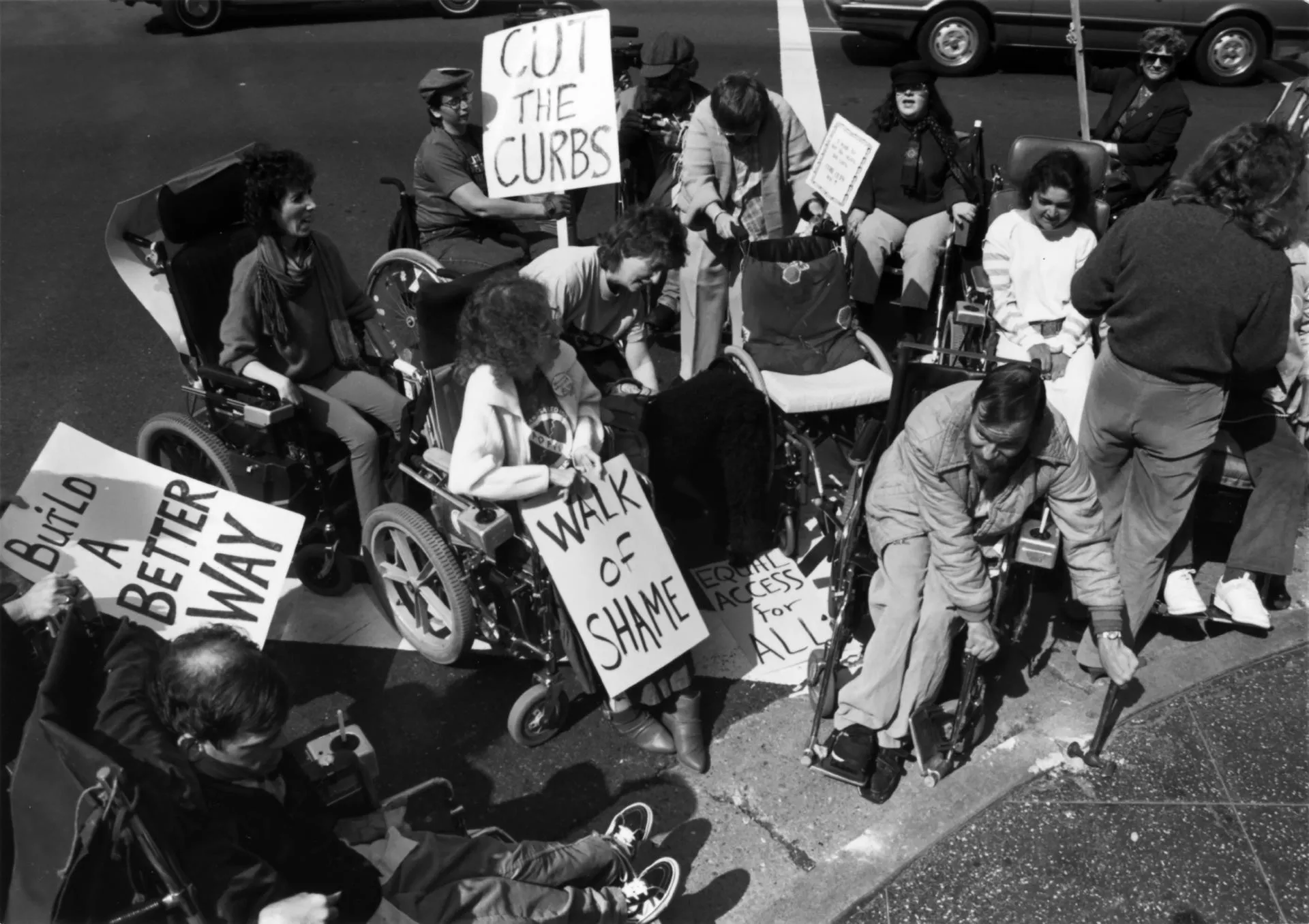
Activists sledgehammering the curb on the Hollywood walk of Fame during the Walk of Shame: Barbara Waxman, Diane Coleman, Susan Gross, Carol Gill, Steve Remington, Rick Wilson, Yvonne Nau and Bill Bolte.
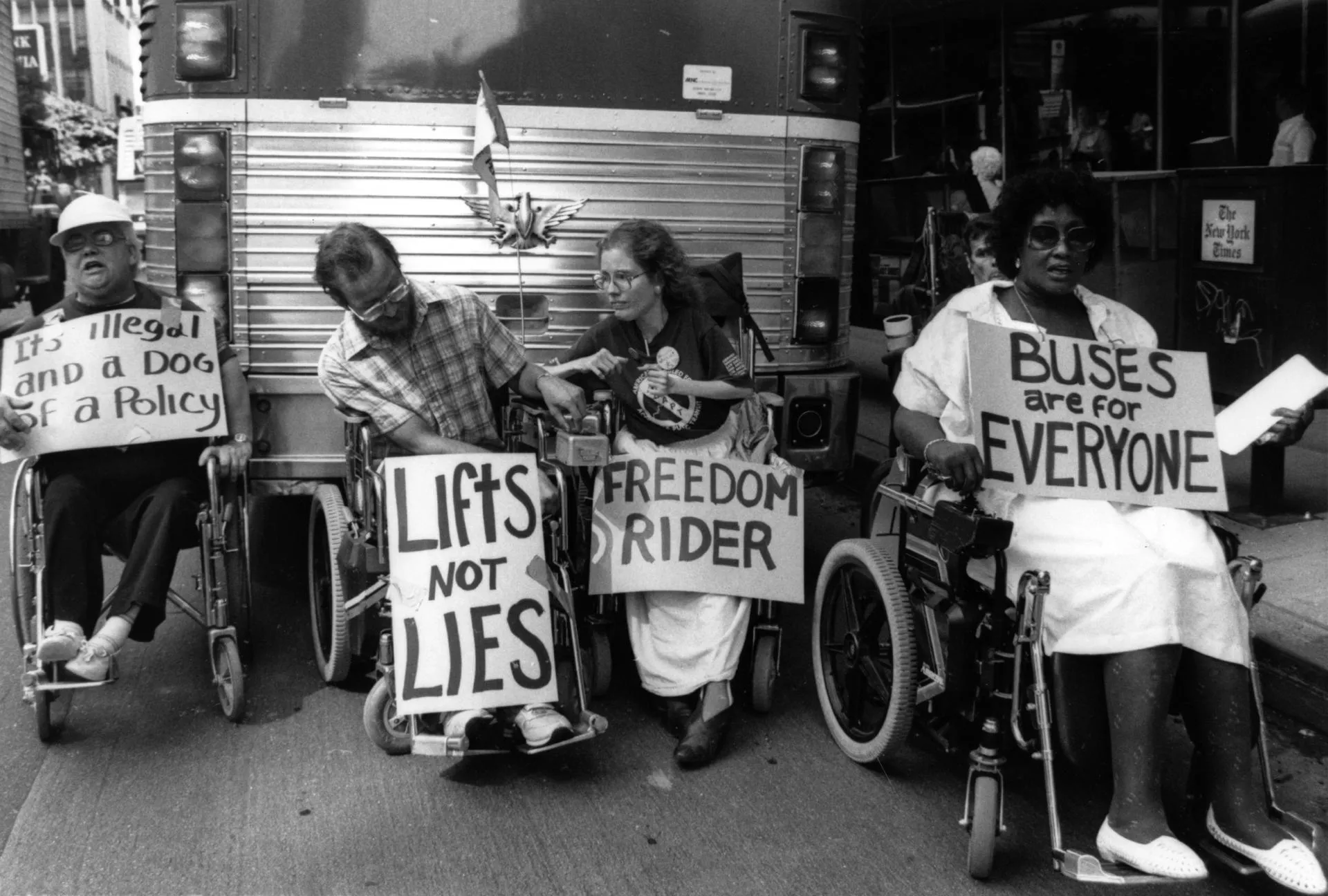
Greyhound Bus Depot in Los Angeles, Diane Coleman, Steve Remington and Rick Wilson.
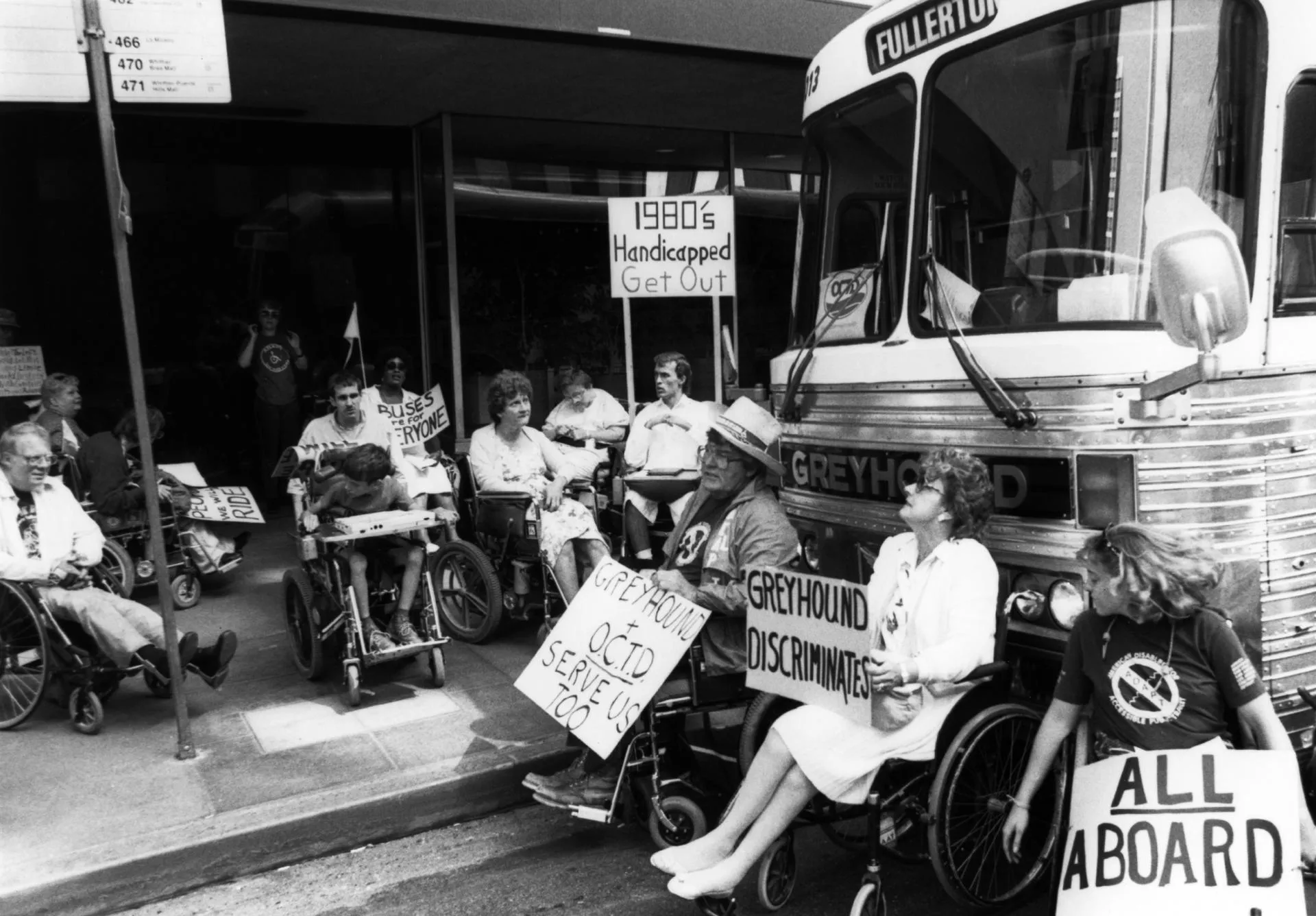
Greyhound bus depot in LA, Bill Zuke, Bill Bolte, Yvonne Nau, Sylvia Drzeweicki, Susan Gross, Ed Tessier, Ryan Duncanwood protestors with protest signs gathered on the sidewalk and front of a parked bus in the street.
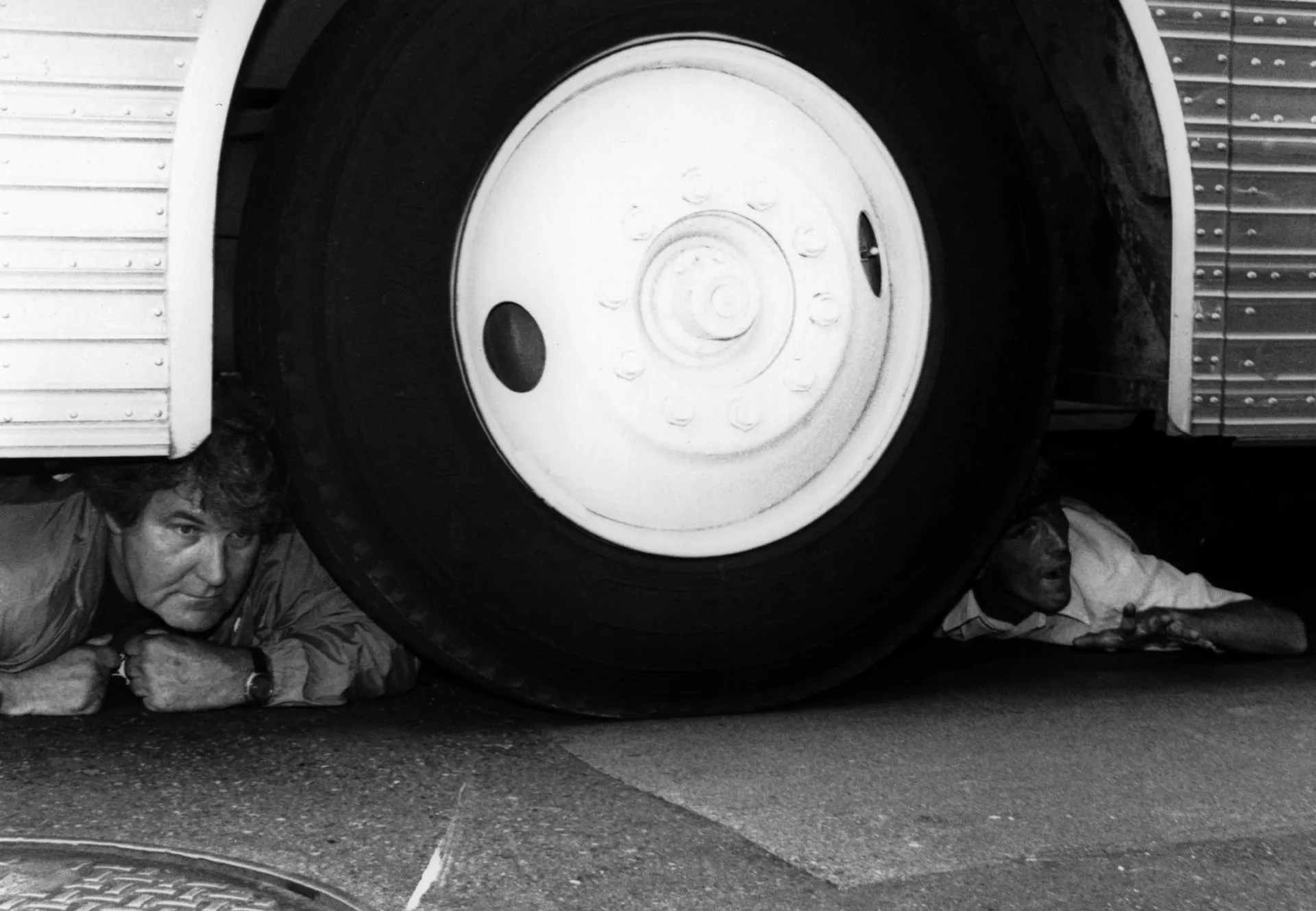
Bill Bolte and Randy Horton lying under the Greyhound bus, like two bookends around a huge Greyhound tire.
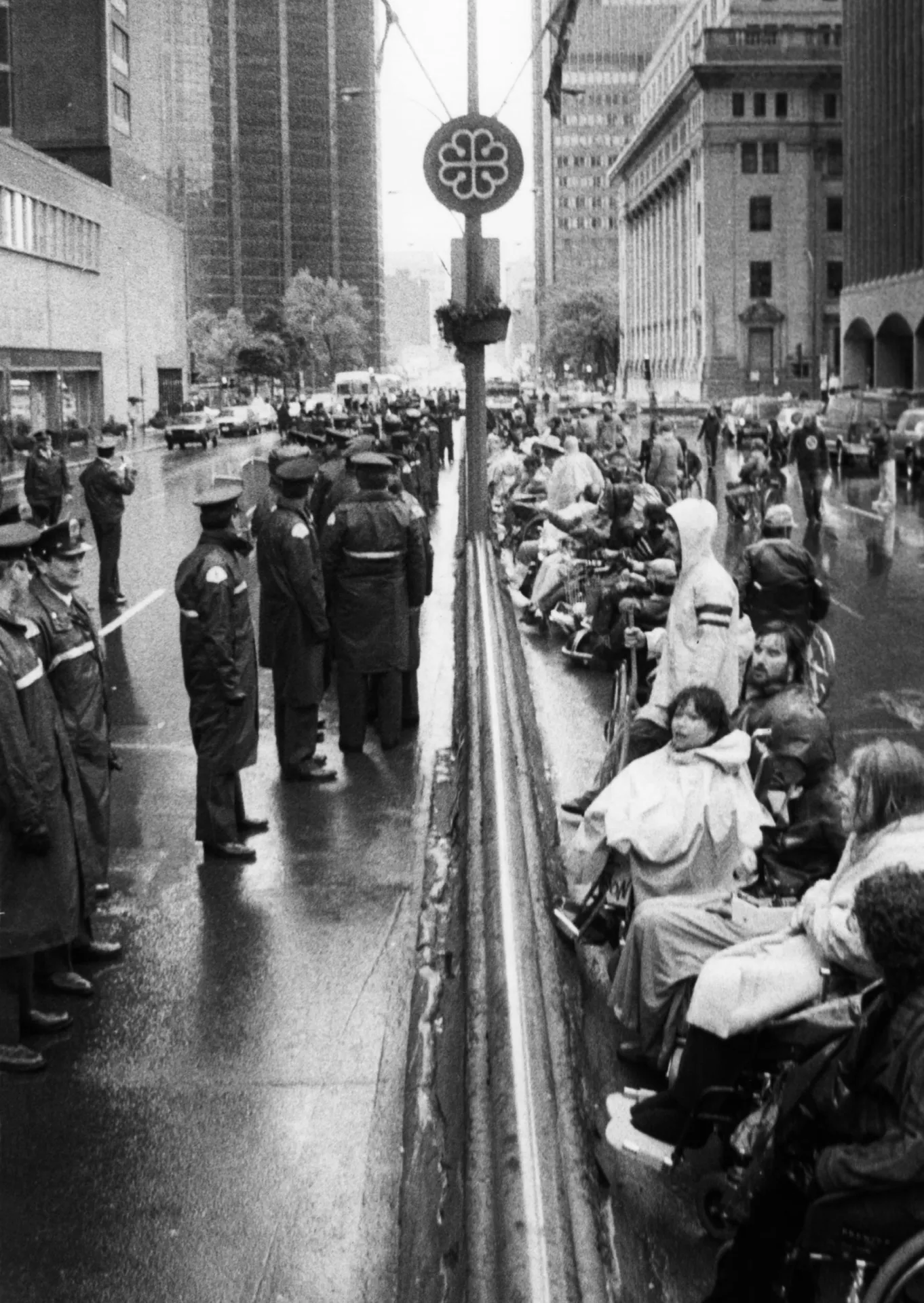
ADAPT invades APTA in Montreal Canada, Lillibeth Navarro and Jim Throssel among the activists lined up down a street and facing off with police in the rain.
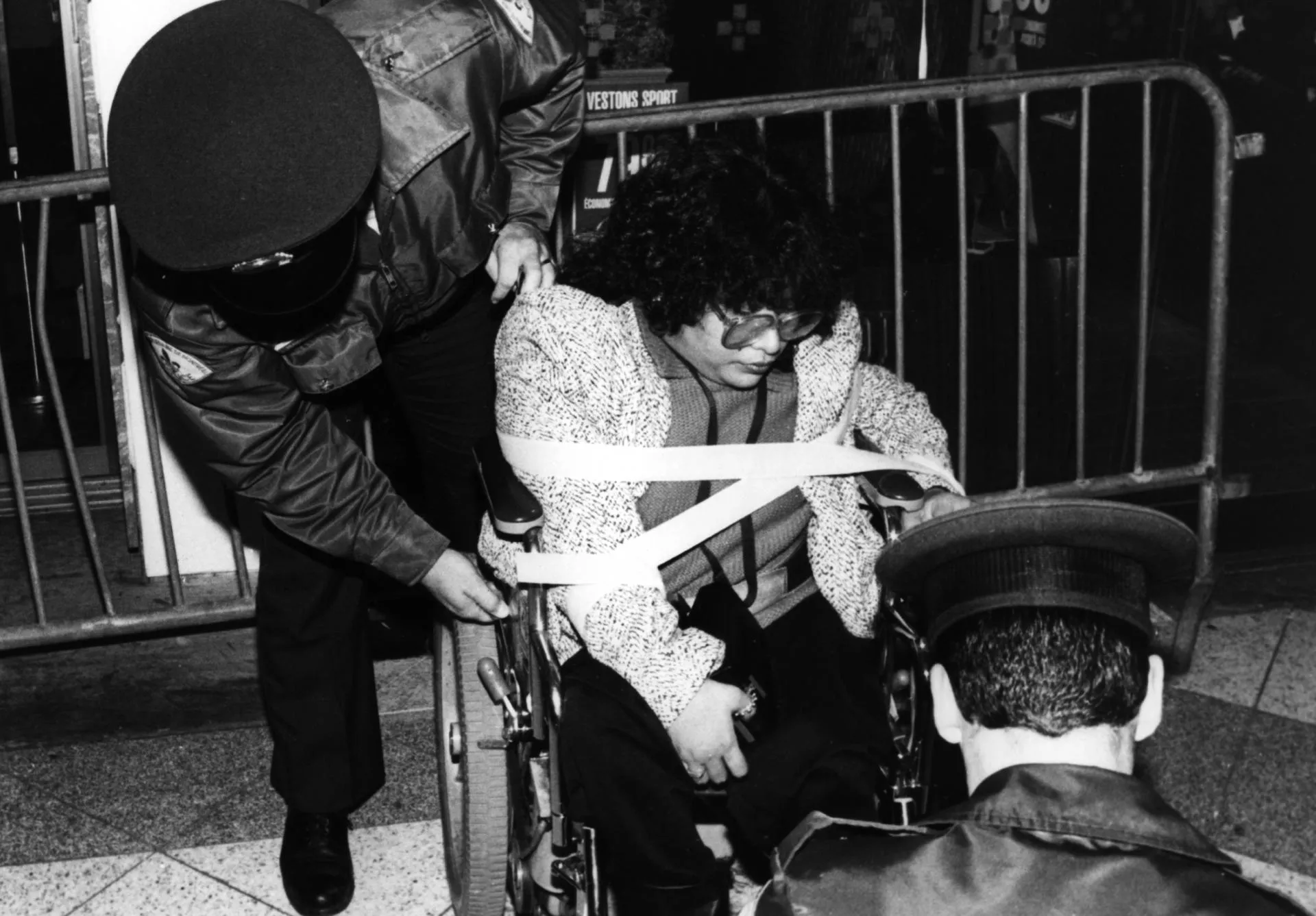
ADAPT in Montreal, Canada, Lillibeth Navarro arrested with Velcrow straps by the Canadian police, made it to the headlines the next day.
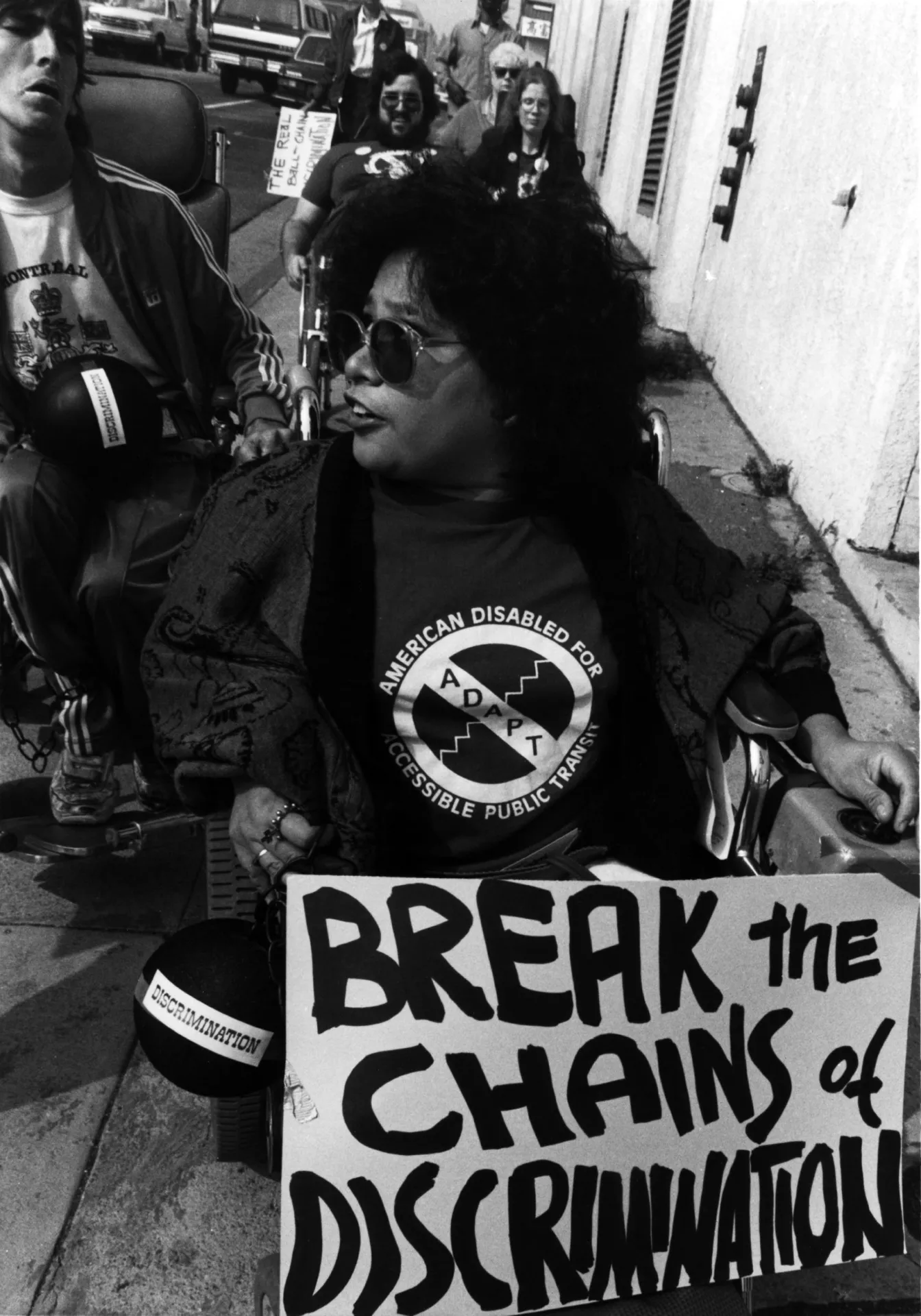
Break the Chains of Discrimination protest sign carried by a protestor, in Los Angeles when Randy Horton, Lillibeth Navarro and Nancy Becker Kennedy were arrested at a protest decrying the budget cuts.
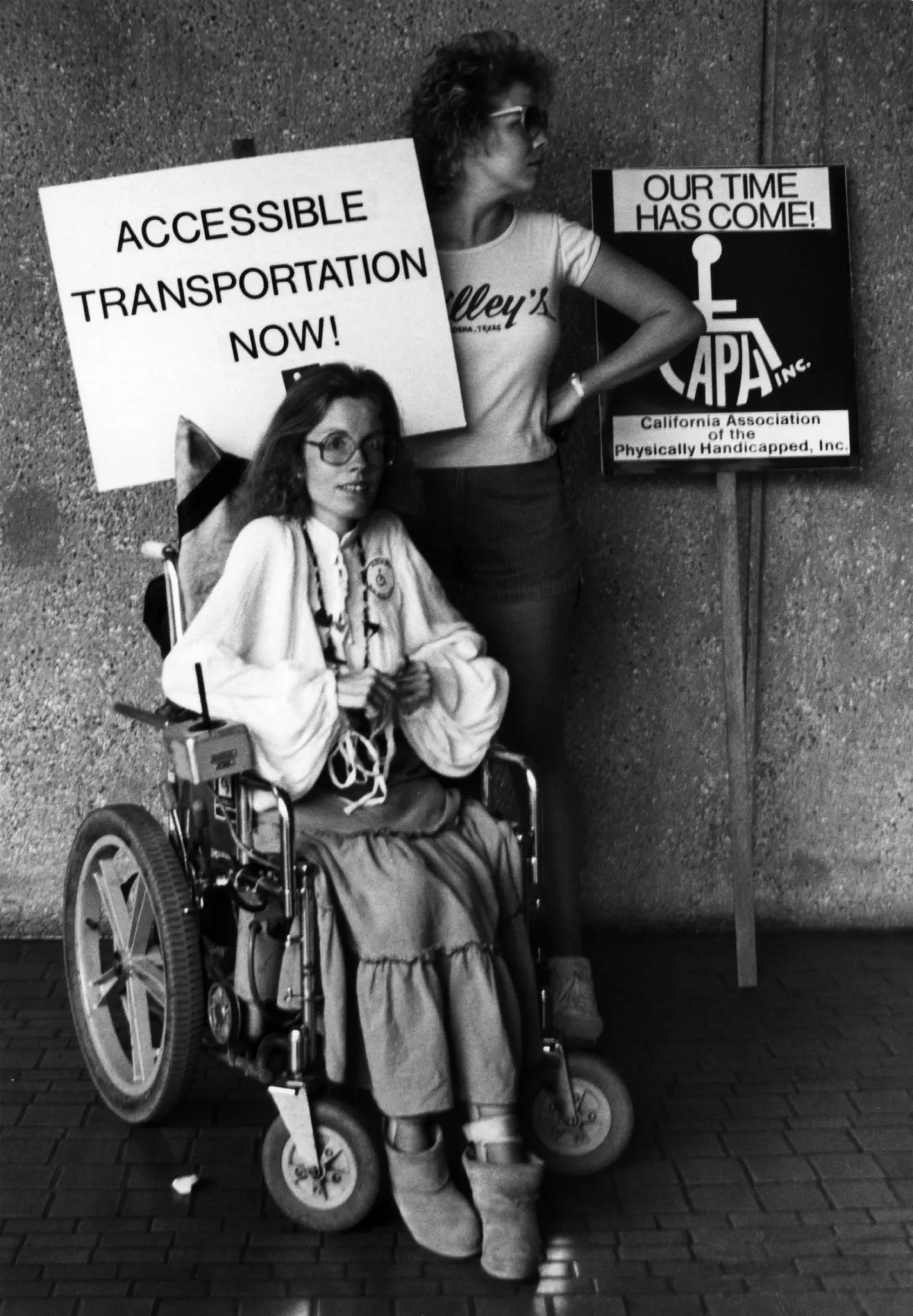
Diane Coleman in Los Angeles sitting in her motorized wheelchair with protest sign which reads “Accessible Transportation Now”.
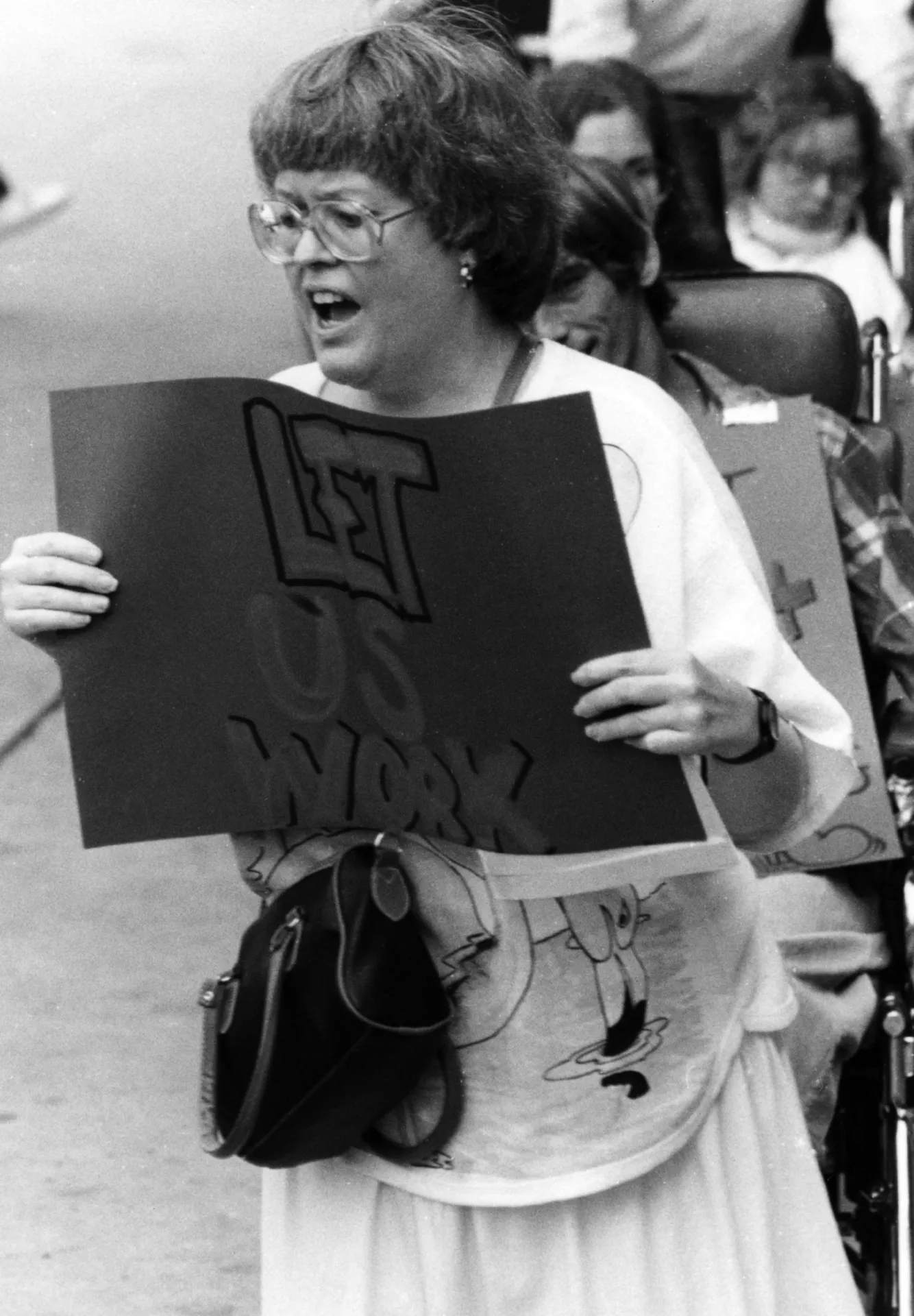
Christina Keeffer with a protest sign that reads “Let Us Work!”
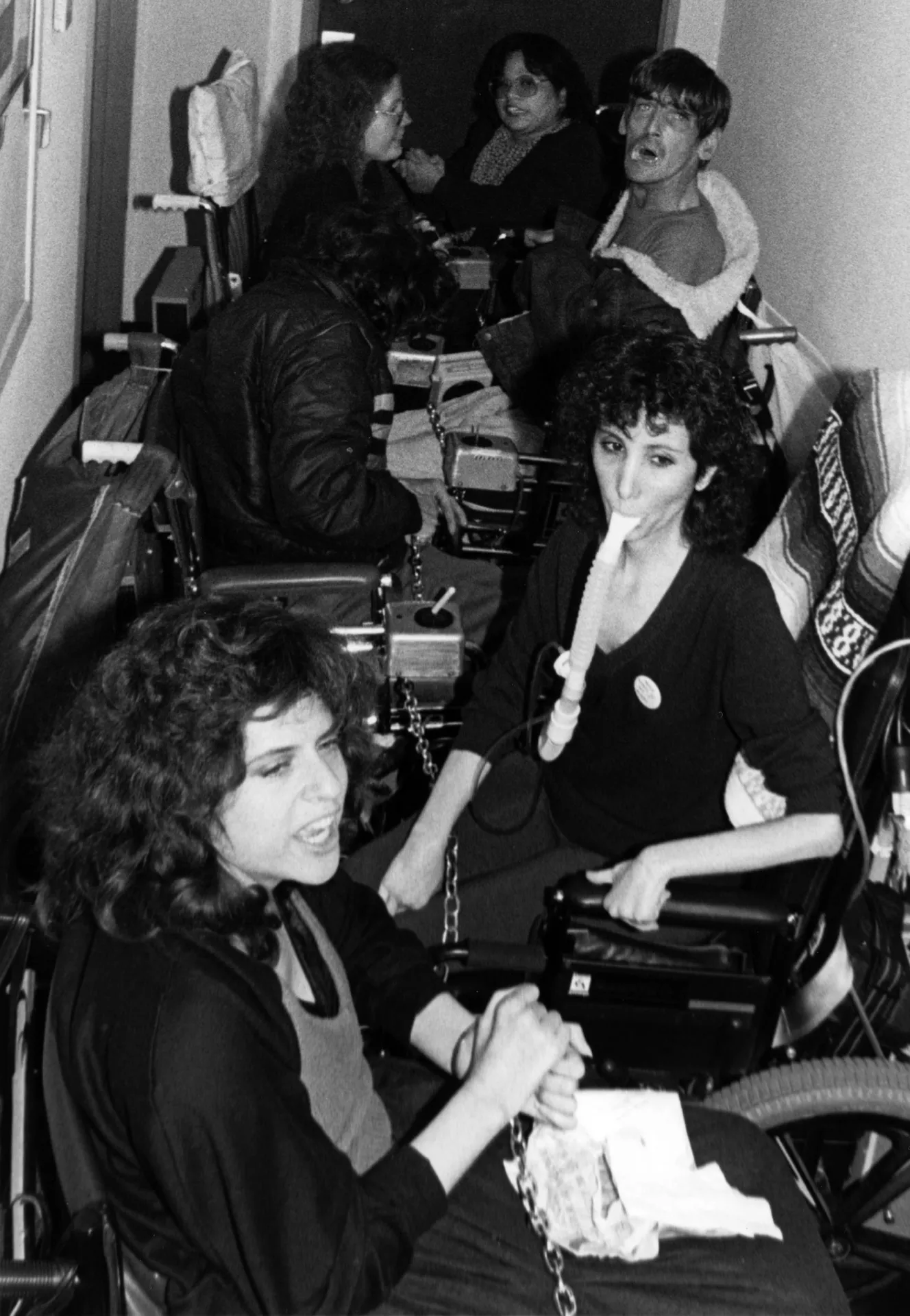
In Los Angeles, Nancy Becker Kennedy, Barbara Waxman, Randy and Kim Horton, Diane Coleman and Lillibeth Navarro chained together and blocking access to a hallway.
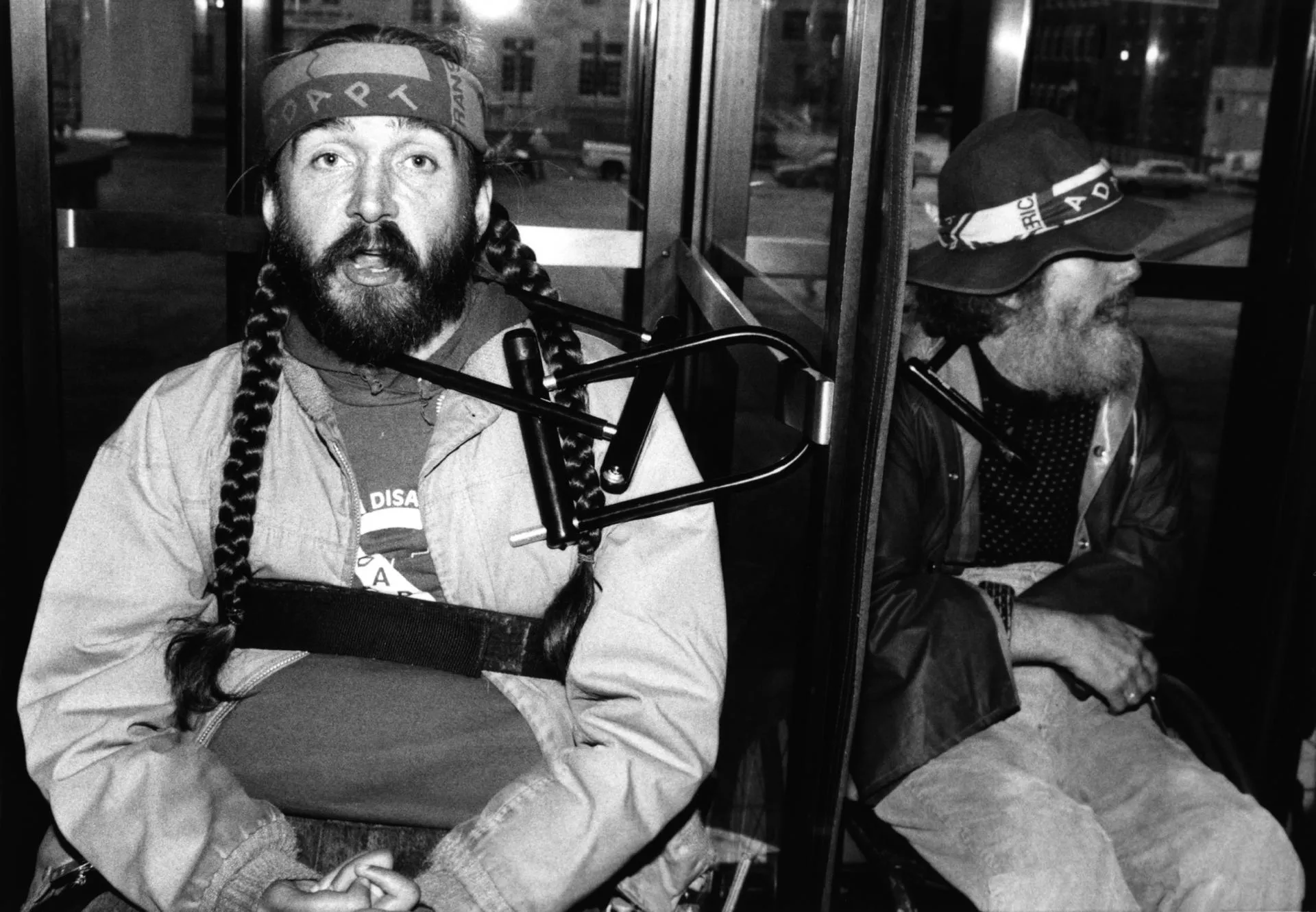
ADAPT in Los Angeles, Mike Auberger and Bob Kafka chained by the neck to a revolving door.
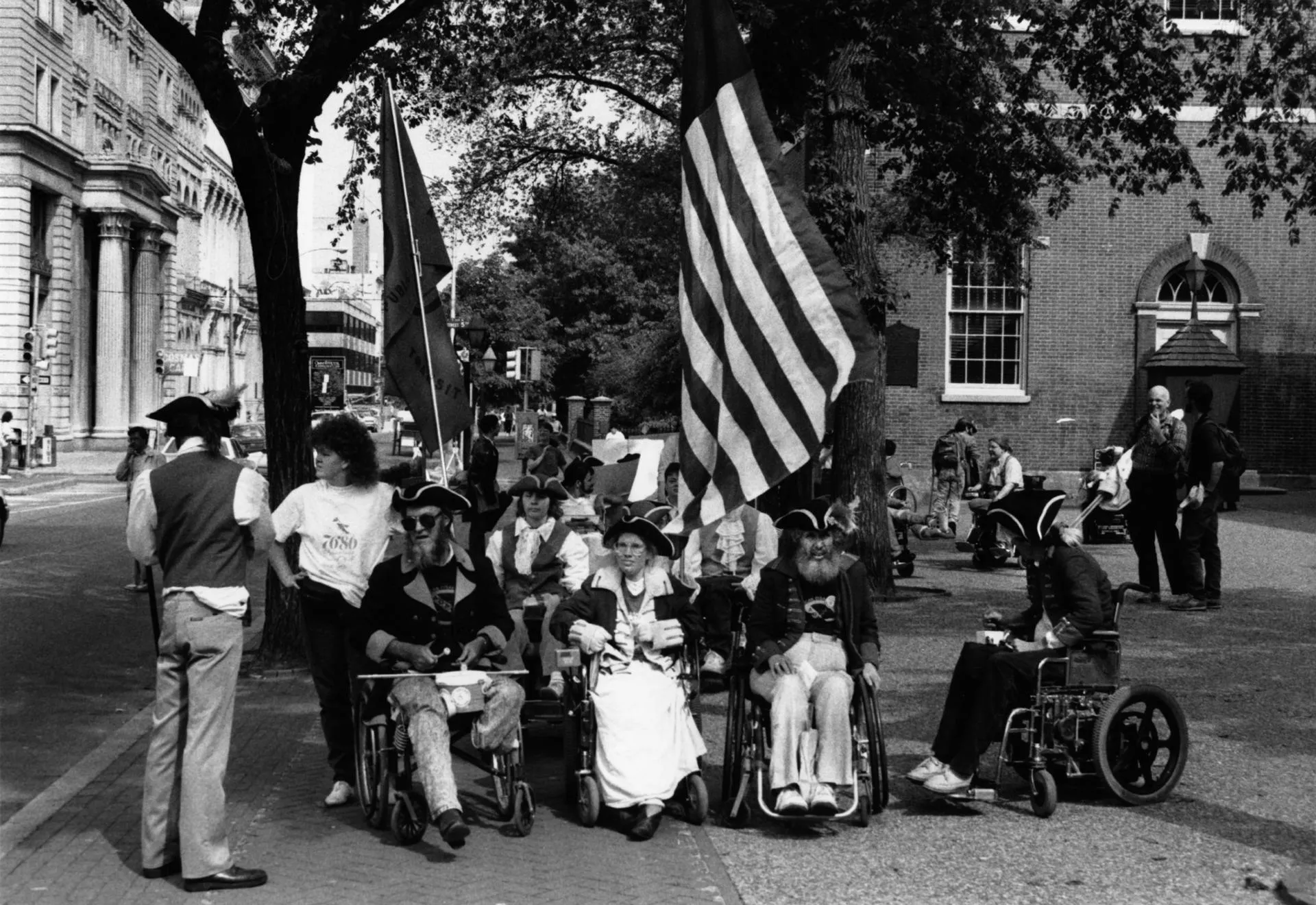
Flag in Philadelphia and Diane Coleman with other activists wearing tricorn hats and revolutionary coats.
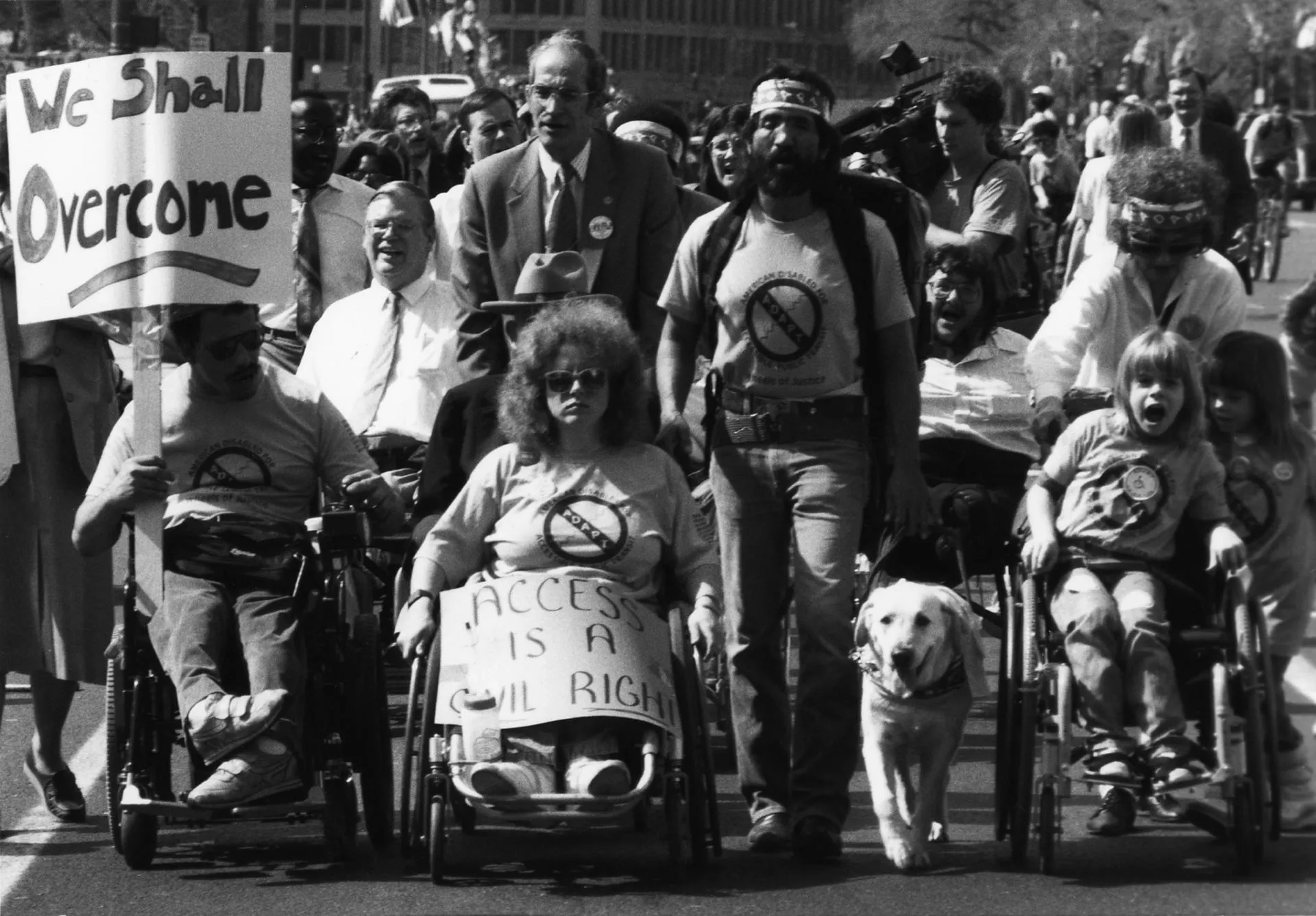
90.0 - Protest sign that reads We Shall Overcome! March of adult and children protesting. Protestors are in wheelchairs, using service animals and walking.
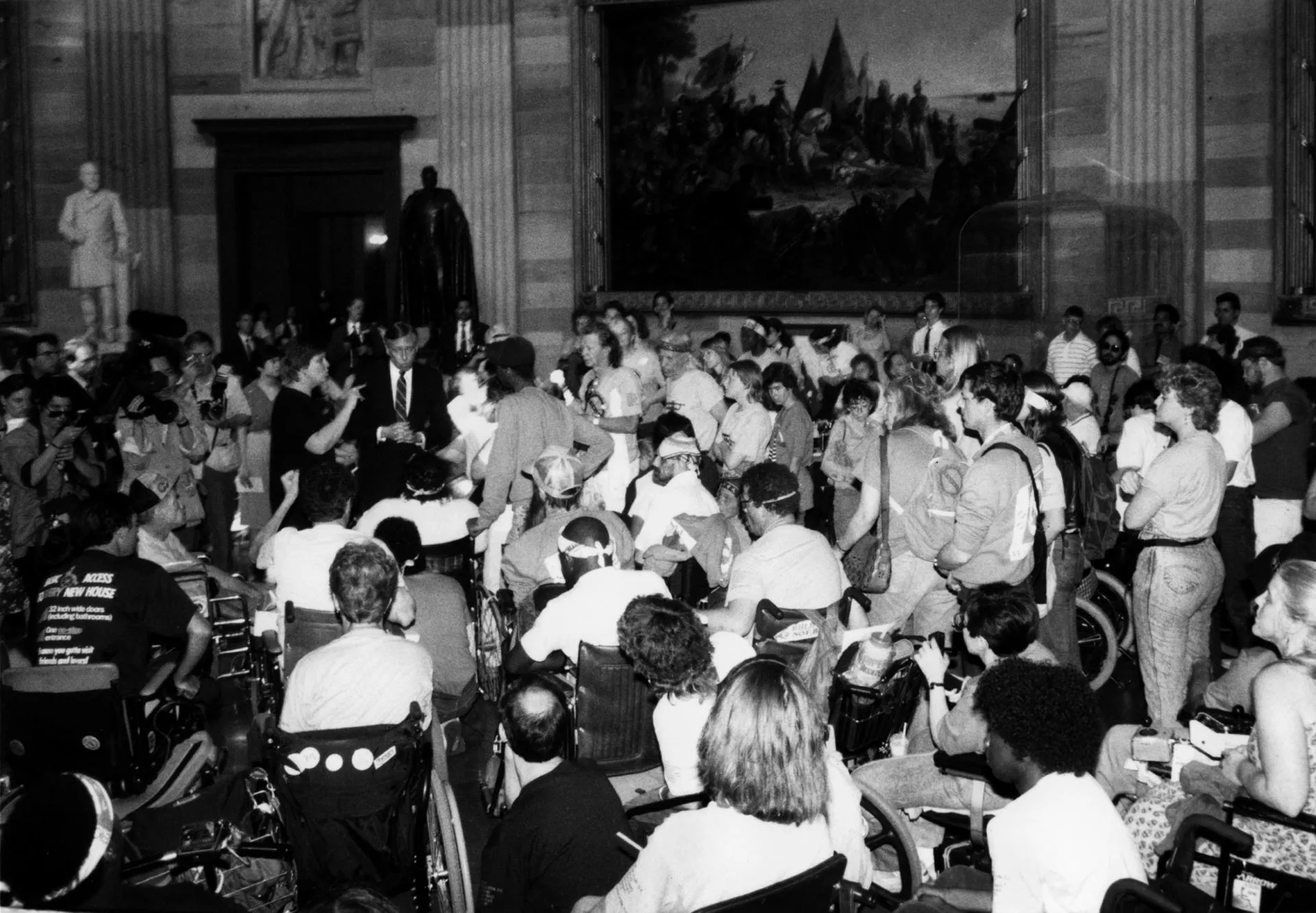
Hundreds of disability rights advocates and activists descend on the Capitol’s Hoyer Rotunda, chanting and pushing for the ADA signing, among them in the picture, Lillibeth Navarro, Gary Bosworth, etc.
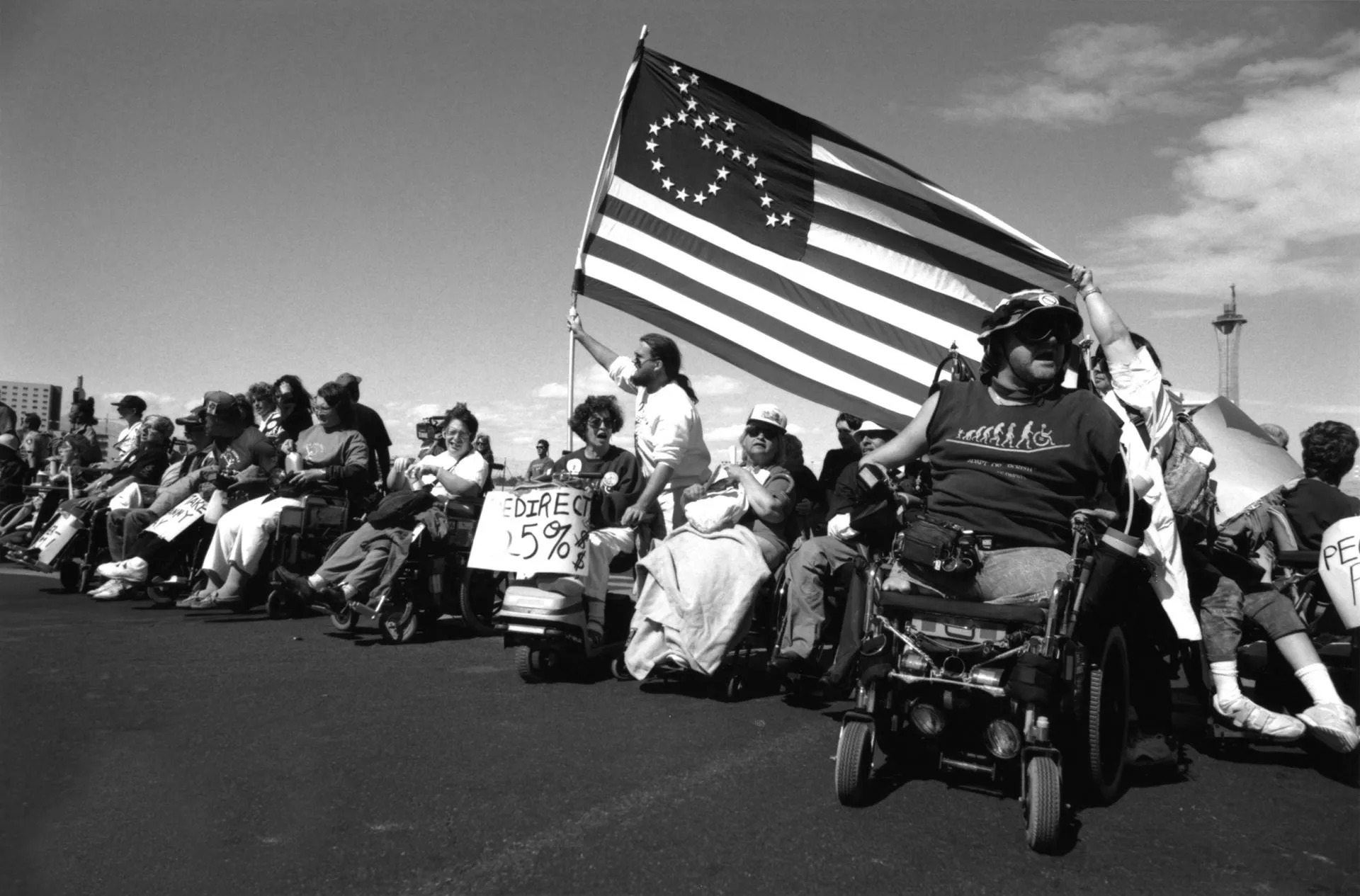
March in Los Vegas, with an American flag in which the stars make up a figure in a wheelchair, and a large wooden cross from which an empty wheelchair hangs.
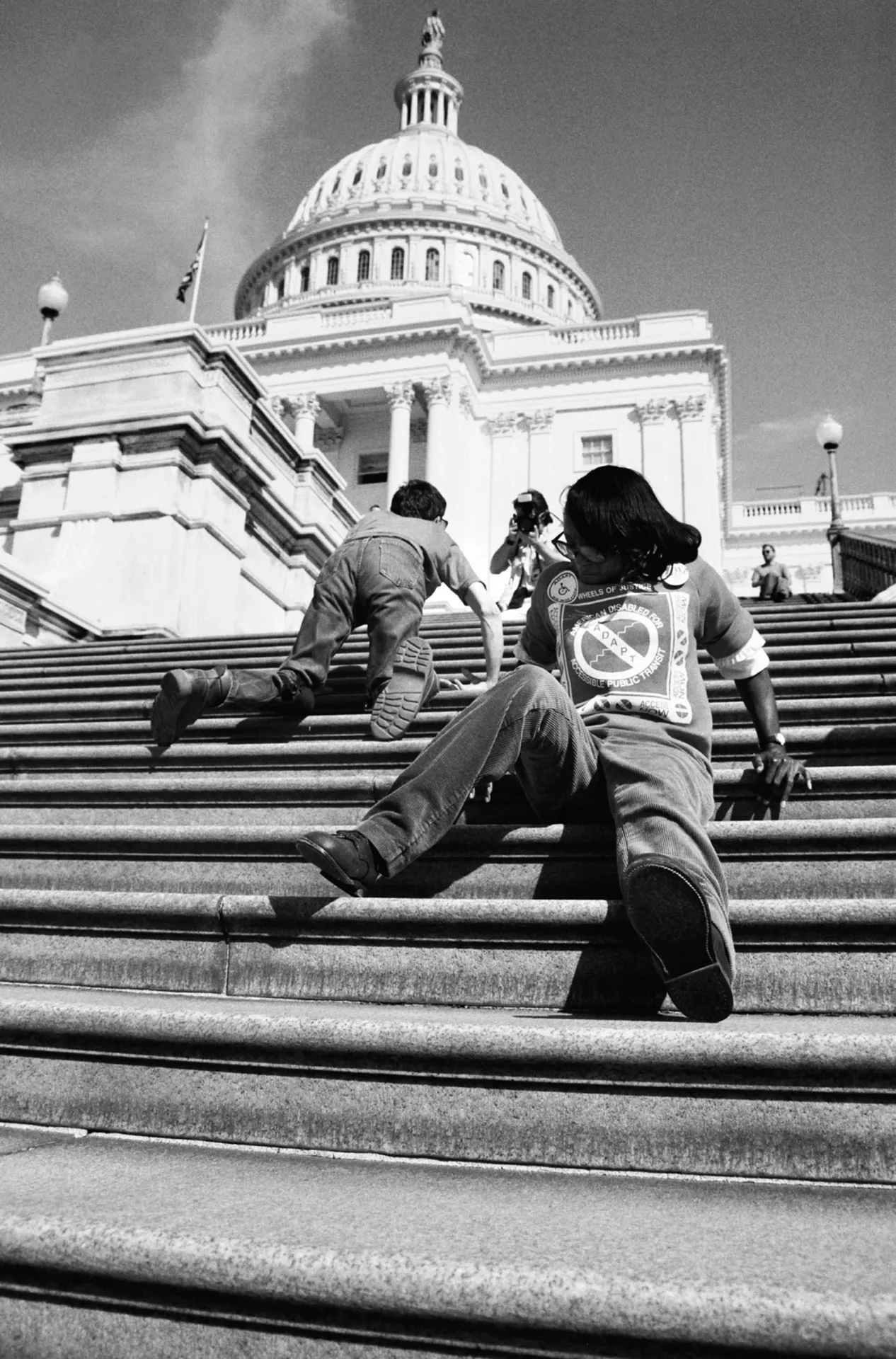
ADAPT activists leave their wheelchairs to ascend the steps to the US Capitol.
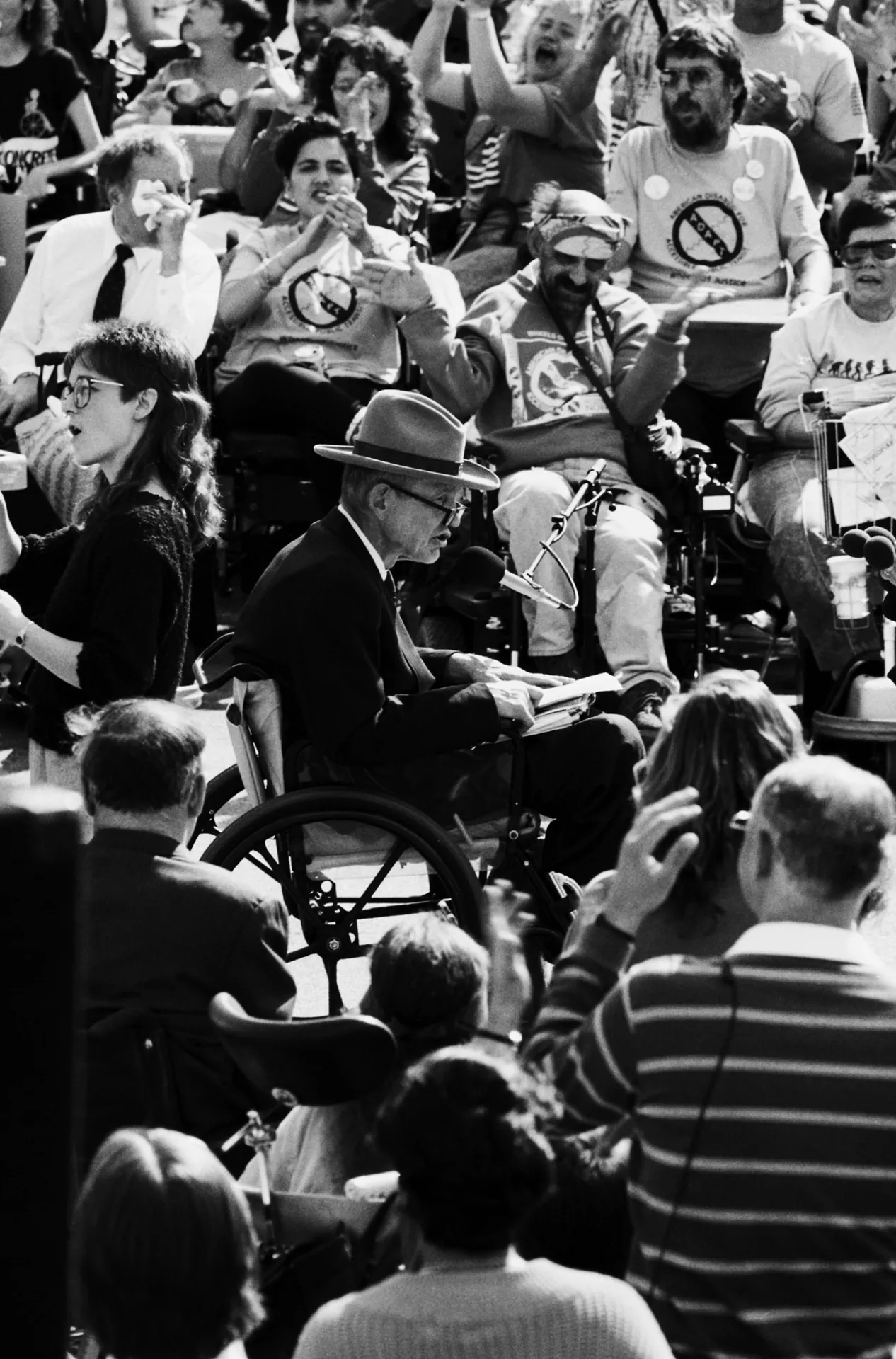
A solemn moment with a true Disabled Patriot and ADA Pioneer Justin Dart speaking into a microphone to the crowd surrounding him.
1989
Mayor Tom Bradley created the City of Los Angeles AIDS Coordinator's Office (ACO) in the Community Development Department.
1990
- AIDS Coordinator's Office (ACO) spearheaded the development of a comprehensive City AIDS Policy which served as a blueprint for the City’s multi-pronged effort to combat HIV/AIDS, which quickly became a national model.
- April 28th - Los Angeles, California. Over 3,000 individuals attended the first ever DEAFestival which was held at California State University, Northridge, California. The late Mayor Tom Bradley declared Deaf Awareness Month and presented a Proclamation to DEAFestival Los Angeles.
1995
May 18th and 19th - DEAFestival event was held at the California State University, Northridge. Los Angeles Cultural Affairs Department, California State University, Northridge Deaf Studies Program and Deaf Communications Foundation.
1998
City Ordinance 171966 established Department on Disability (DOD).
2000
- The City transferred the AIDS Coordinator's Office (ACO) into the Department on Disability. This transfer was the first of its kind in the country. Doing so acknowledged that as people living with HIV lived longer, they faced many of the same challenges faced by people living with other long-term disabilities.
- The Art Festival event moved to the City of Los Angeles when Councilman Pacheco and Mayor Riordan proclaimed "May" as Deaf Awareness Month in the City of Los Angeles and hosted arts and cultural festival on Olvera Street in his Council District (CD) 14 and partnered with GLAD, a non-profit organization serving Deaf and Hard of hearing.
2003
The AIDS Coordinator's Office (ACO) in conjunction with the Mayor’s AIDS Leadership Council released a White Paper titled “HIV and AIDS in Los Angeles: 21st Century Challenges and Approaches” which has served as a template the office has followed in our goal to fulfill our mission.
2004
Councilmember Cárdenas (CD6), partnered with the Department on Disability, CSUN Deaf Studies Program, GLAD, Friends of the Family and other Deaf organizations hosted DEAFestival Los Angeles at Woodley Park. Los Angeles Mayor James Hahn and Los Angeles Councilman Cardenas (CD6) proclaimed "September" as Deaf Awareness Month in the City of Los Angeles jointly with the National celebration held in September 21-27.
2005
September 24th - Councilmember Tony Cárdenas (CD6), in partnership with Department on Disability, CSUN Deaf Studies Department, Department of Cultural Affairs and Department of Recreation and Parks hosted the DEAFestival Los Angeles event at the Woodley Park. Gregg Brooks was a Master of Ceremonies. Simon Carmel performed at the Magic show. ASL Storytelling signed by Bernard Bragg, Lil Quartermus, Michael Olivier and David Prince.
2006
On World AIDS Day 2006, the AIDS Coordinator's Office (ACO) launched the “Get Tested” campaign to draw attention to the importance of HIV testing among the city’s diverse populations. The campaign consisted of six billboards and called on people to take responsibility for making change within their communities, while acknowledging that HIV affects all of our communities together.
2007
In November of 2007, the AIDS Coordinator's Office (ACO) in conjunction with the Mayor’s office launched the second phase of the “Get Tested” campaign by launching the “City’s HIV Testing Initiative” which aimed to significantly expand awareness and availability of HIV testing in the city. A side effect being a reduction in the stigma associated with taking an HIV test. The Initiative ran for three years, sun-setting in December of 2011. Part of the roll out of the Initiative involved a ThinkTank in conjunction with UCLA to talk about the future of HIV testing; a Hospital Summit aimed at engaging private hospitals and having them agree to offer routine testing in their facilities; and for the first time the ACO offered direct funding for training and implementation of routine HIV testing.
2010
- The City AIDS Policy was updated to reflect changes in the HIV epidemic, federal law and available resources where individuals can go for recourse if they experience discrimination.
- DEAFestival was held at Woodley Park. Charles Katz was a Master of Ceremonies. Honorees: Jeremias Valencia. Charles Katz hosted Deaf’s Got Talent withKhai Nguyen as an Assistant. Judges: Gerald “Bunny” Burstein, Joyce Linden & Vikee Waltrip. ASL Poetry performed by Don Lee Haunami and ASL Storytelling signed by Sherri Hicks. Fred Beam hosted the DEAFinit Models Fashion Show.
2014
AIDS Coordinator's Office (ACO) White Paper
2015
- The 25th Anniversary of the Americans with Disabilities Act is July 26th, 2015!
- The Los Angeles Mayor Eric Garcetti Speaks at 31st Annual AIDS Walk Los Angeles (YouTube Video)
- The City of Los Angeles Councilmember Mitch O’Farrell (CD13) and the Department on Disability hosted the Annual DEAFestival, which was held at downtown Los Angeles City Hall. Dickie Heart was a Master of Ceremonies for the day event and Nyle DiMarco was a Master of Ceremonies for the Fashion Show.
2020
- Commemoration of 30 years of the Americans with Disabilities Act
- Los Angeles, like other major cities, grappled with the immediate challenges of the pandemic on its disabled population. This included concerns about accessible testing sites, equitable distribution of vaccines, access to essential services during lockdowns, and the digital divide impacting remote work and education for individuals with disabilities.
2022
- The Department on Disability, in partnership with Grand Performances and Street Food Cinema, hosted its 5th annual ReelAbilities Film Festival at California Plaza in Downtown LA. This three-day event showcased new and classic films, conversations, and programs dedicated to promoting awareness and appreciation of the lives, stories, and artistic expressions of people with disabilities, offering a fully accessible experience for attendees.
2023
- Los Angeles City Council members introduced and passed motions related to improving accessibility in specific city facilities (like City Hall) or public spaces, often in response to community input or identified barriers.
- After more than two decades of development, the U.S. Access Board officially issued the final rule for PROWAG, publishing it in the Federal Register. These guidelines provide comprehensive technical requirements for accessible sidewalks, crosswalks, pedestrian signals, on-street parking, and other components of public rights-of-way. While the guidelines became effective on September 7, 2023, they become legally enforceable for specific agencies only once adopted by the U.S. Department of Justice (DOJ) and the U.S. Department of Transportation (DOT). This marks a landmark achievement in ensuring consistent and effective accessibility standards for pedestrian facilities nationwide, including in Los Angeles.
2024
- The U.S. Access Board, a federal agency responsible for developing accessibility guidelines, held a public town hall meeting at The California Endowment’s Center for Healthy Communities in Los Angeles. This significant event brought Presidentially appointed Access Board members and representatives from various federal agencies to hear directly from the local community about the state of accessibility in Los Angeles.
- The Department on Disability, in partnership with Grand Performances, hosted its 6th annual ReelAbilities Film Festival at California Plaza in Downtown LA. This event continued the tradition of showcasing films and discussions that promote awareness and appreciation for the lives, stories, and artistic expressions of people with disabilities, further solidifying LA's commitment to inclusive cultural programming.
- The U.S. Department of Transportation (DOT) issued a final rule adopting PROWAG as part of its ADA standards for new construction and alterations of transit stops in the public right-of-way, effective January 17, 2025.
- The U.S. Department of Justice published its final rule, codified as Subpart H to 28 CFR Part 35 (Title II of the ADA), establishing specific technical standards (WCAG 2.1 Level AA) for the accessibility of web content and mobile applications provided by State and local government entities. This landmark rule, which goes into effect on June 24, 2024, provides clear guidelines for public entities (including the City and County of Los Angeles) to ensure their online services, programs, and activities are accessible to people with disabilities. Compliance deadlines are tiered, with larger entities (population 50,000 or more) having until April 24, 2026, and smaller entities until April 24, 2027.
2025
- July 26: Celebrating 35 Years of the Americans with Disabilities Act (ADA)! The year 2025 marks the 35th anniversary of the signing of the landmark Americans with Disabilities Act (ADA) on July 26, 1990. This significant milestone is being celebrated nationwide, recognizing the profound impact the civil rights law has had on promoting equal opportunity and prohibiting discrimination against people with disabilities in all areas of public life—including employment, public accommodations, transportation, state and local government services, and telecommunications.
